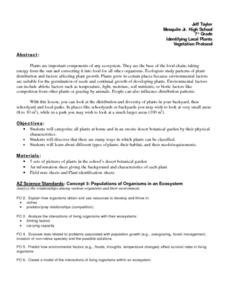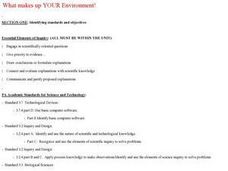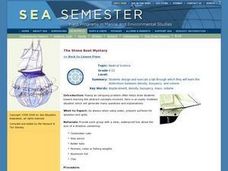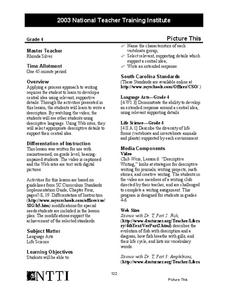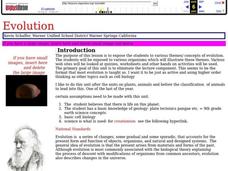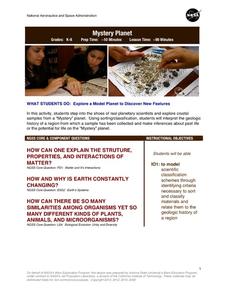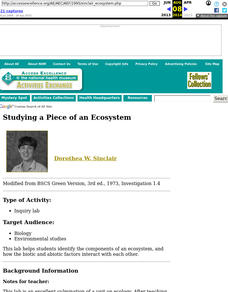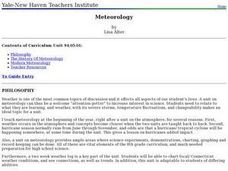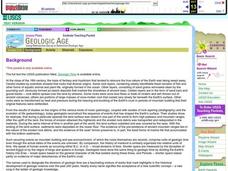Curated OER
Water Quality And pH
Students determine the pH level of water and its effect on aquatic plants and brine shrimp eggs. This is a three part lesson that leads the student through the development of an understanding of water pH. They form a hypothesis and are...
National Geographic
Rescuing, Relocating, and Rehabilitating Wildlife
Bring up the Deepwater Horizon (BP) oil spill that occurred in the Gulf of Mexico in 2010. Display the colorful diagram of the coastal and marine organisms living in the area. Show a video about relocating the eggs of the Gulf's sea...
Curated OER
U.S. History: Antebellum Heroes and Villains
Eighth graders research and write reports on key figures of the Antebellum Period. The projects also include pictures, bibliographies, and timelines about their assigned figure. In addition, 8th graders present oral reports to classmates.
Curated OER
Exploring Biomes Lesson 3: Endangered Biomes
Future environmental scientists compare data from two different conservation strategies. Alone this lesson is sufficient, but as part of the Exploring Biomes unit produced by the Arizona Fish and Game Department, it becomes top-notch.
Curated OER
What A Tangled Web We Weave
Learners of many ages discuss how all organisms rely on other organisms for their survival. They construct a food web and energy pyramids, and write an informative essay about the food web that they have designed.
Curated OER
Explore Your Natural Habitat
Students identify habitats and understand why they are important to our environment. For this environmental lesson students design their own habitat, observe and record data on the impact their habitat has on the environment.
Curated OER
What makes up YOUR Environment!
Middle schoolers create their own land or water environment. They make their environment livable for all the different animals they collect to put in it. Students research the types of animals that they can have in their environment,...
Curated OER
Ecosystems and Remote Sensing
Students obtain remote sensing data to compare and contrast global biomass data with global temperature data.
Gobal Oneness Project
Passionate Pursuits
Not all technology is digital. Teach learners about the low-tech maker movement with a photo essay about six artisans from California and two articles about the local creator movement. After tackling the photo essay in small groups,...
University of Southern California
Mastering Microbes
Small but mighty! Learners explore the role of microbes in a healthy ecosystem. An engaging lesson asks pupils to design an aquaponics system that demonstrates that healthy microbes are necessary to maintain the ecosystem.
Curated OER
Wildlife Variety Show: Biodiversity In Illinois
Eighth graders write a short report in first person about any plant or animal found on a list of Illinois species. They become the character of the plant or animal and give a short report describing the plant or animal.
Curated OER
The Stone Boat Mystery
Young scholars design and execute a lab through which they study the distinctions between density, buoyancy, and volume.
Curated OER
Design a Reef!
Using a miniature coral reef aquarium kit, young ecologists model this unique ecosystem. They research various coral reef organisms and their niches, and they culminate the project by working together to write a report. Use this activity...
Curated OER
Write a Description
Finding the central idea is the focus of this activity. Middle schoolers write descriptions of different animals using details and descriptive language. They watch a video of kids using descriptive language, and then use showing language...
Curated OER
Evolution
Explore the concept of evolution and cell biology; your class can work in groups to use the internet to view websites on evolution, take a quiz, and complete a lab activity.
NASA
Mystery Planet
What can one learn about a planet based on a small surface sample? Learners will explore artifacts from a mystery planet and see what they can determine about the planet based on the evidence in front of them.
Outdoor Learning Center
Outdoor Survival
Which of the following can you survive without for the longest time: water, food, or a positive mental attitude? The answer may surprise you. Guide learners of all ages through games, activities, and discussions about surviving in the...
Channel Islands Film
Island Cattle Ranching
Is cattle ranching on Santa Rosa island viable or non-viable? Rather than focusing on the issues of the transition of Santa Rosa island from a privately owned island cattle ranch to a national park, class members are asked to consider if...
Curated OER
A Natural Habitat: What, How and Why
Students understand what a habitat is. They determine why a habitat is important to our environment no matter where it is located. Students observe and recognize natural habitats in their surroundings.
Curated OER
Studying a Piece of an Ecosystem
Students carry out an outdoor land study in which they identify organisms living in the soil, and any other animals living within the site. Groups also examine abiotic factors. They respond to a series of questions concerning their data...
Michigan Sea Grant
Water Quality
Learners observe water samples and measure the samples' water quality. Students develop their own criteria for measuring water quality and test for temperature, acidity, oxygen levels, turbidity, conductance, sediment and hardness.
Curated OER
Meteorology
Students research and produce an oral history that reflects the importance of meterologists in the lives of people in their community.
Curated OER
Protecting Philippine Reefs
Students watch a slide show about the Philippine Reefs to explore the topic of fish populations. In this reef and fish population lesson, students watch a slide show about fish populations and how the Peace Corps works with Filipinos to...
Curated OER
Geologic Age
Students investigate radioactivity as a tool for measuring geologic time and how geologists use this information to determine the absolute age of rocks or minerals.




